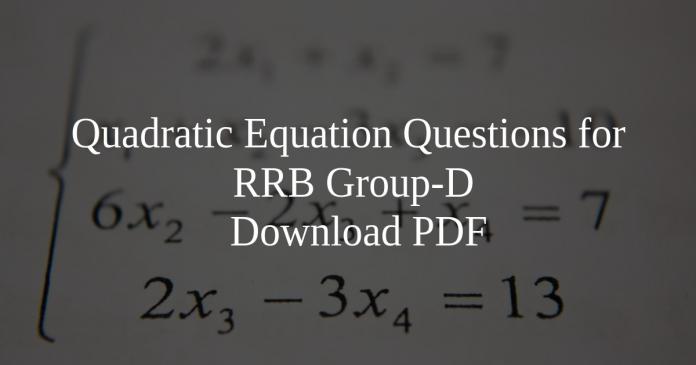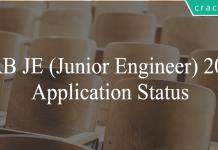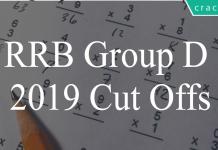Quadratic Equation Questions for RRB Group-D PDF
Download Top-10 RRB Group-D Quadratic Equations Questions PDF. RRB GROUP-D Maths questions based on asked questions in previous exam papers very important for the Railway Group-D exam.
Download Quadratic Equation Questions for RRB Group-D PDF
Download RRB Group-D Previous Papers PDF
Take a RRB Group-D free mock test
Question 1: Which of the following quadratic equations has real roots?
a) $4x^{2}-3x+6=0$
b) $2x^{2}+7x+6=0$
c) $x^{2}-2x+4=0$
d) $3x^{2}-4x+3=0$
Question 2: What is the value of m in the quadratic equation $x^{2}+mx+24=0$ if one of its roots is $\frac{3}{2}$
a) $-\frac{45}{2}$
b) 16
c) $-\frac{21}{2}$
d) $-\frac{35}{2}$
Question 3: What are the roots of the quadratic equation: $x^2 + 3x – 154 = 0$
a) 21, 14
b) 11, -14
c) 14, -11
d) 14, 22
Download RRB Group-D Previous Papers PDF
Take a RRB Group-D free mock test
Question 4: What are the roots of the quadratic equation $21x^{2} – 37x – 28 = 0$ ?
a) $\frac{-7}{3}, \frac{4}{7}$
b) $\frac{3}{7}, \frac{-7}{4}$
c) $\frac{7}{3}, \frac{-4}{7}$
d) $\frac{-3}{7}, \frac{7}{4}$
Question 5: Which of the following quadratic equations has real roots?
a) $4x^{2}-9x + 6 = 0$
b) $3x^{2}-2x + 6 = 0$
c) $2x^{2}-7x + 6 = 0$
d) $x^{2}-2x+2=0$
Question 6: What are the roots of the quadratic equation $4x^{2} + 6x – 18 = 0$?
a) 3, -3
b) 3, 6
c) 3/2, -3
d) 3, 3
RRB Group D previous year papers
Question 7: Which of the following quadratic equations has real roots?
a) $3x^{2}-5x+2=0$
b) $3x^{2}-4x+2=0$
c) $4x^{2}-3x+2=0$
d) $5x^{2}-2x+2=0$
Question 8: Find the roots of the quadratic equation : $27x^2 + 57x – 14 = 0$
a) 2/9, 7/3
b) 2/9, -7/3
c) 9/2, 3/7
d) 9/2, 3/7
RRB Group-D Important Questions (download PDF)
Question 9: Which of the following is not a quadratic equation?
a) $3x(x + 5) -11 = 2x(x – 2) + 6$
b) $4x(x + 3) + 7 = 4x(x – 11) + 9$
c) $x(x + 2) -15 = x(2x – 5) + 11$
d) $4x^{2} – 6x – 9 = 0$
Question 10: Find the difference of the roots of the equation $x^2-8x+13=0$
a) 2
b) 4
c) $2\sqrt{3}$
d) $4\sqrt{3}$
General Science Notes for RRB Exams (PDF)
Answers & Solutions:
1) Answer (B)
A quadratic equation : $ax^2 + bx + c = 0$ has real roots iff Discriminant, $D = b^2 – 4ac \geq 0$
(A) : $4x^{2}-3x+6=0$
=> D = $(-3)^2 – 4(4)(6) = 9 – 96 = -87$
(B) : $2x^{2}+7x+6=0$
=> D = $(7)^2 – 4(2)(6) = 49 – 48 = 1$
(C) : $x^{2}-2x+4=0$
=> D = $(-2)^2 – 4(1)(4) = 4 – 16 = -12$
(D) : $3x^{2}-4x+3=0$
=> D = $(-4)^2 – 4(3)(3) = 16 – 36 = -20$
Thus, the equation : $2x^{2}+7x+6=0$ has real roots.
2) Answer (D)
Putting $x=\frac{3}{2}$ in the quadratic equation : $x^{2}+mx+24=0$
=> $(\frac{3}{2})^2+m(\frac{3}{2})+24=0$
=> $\frac{9}{4}+24+\frac{3m}{2}=0$
=> $\frac{3m}{2}=-(\frac{96+9}{4})$
=> $m=\frac{-105}{4}\times\frac{2}{3}$
=> $m=\frac{-35}{2}$
=> Ans – (D)
3) Answer (B)
Equation : $x^2 + 3x – 154 = 0$
=> $x^2 + 14x – 11x – 154 = 0$
=> $x(x+14) – 11(x+14) = 0$
=> $(x+14)(x-11) = 0$
=> $x = -14,11$
=> Ans – (B)
4) Answer (C)
Equation : $21x^{2} – 37x – 28 = 0$
=> $21x^2-49x+12x-28=0$
=> $7x(3x-7) +4(3x-7)=0$
=> $(7x+4)(3x-7)=0$
=> $x = \frac{-4}{7} , \frac{7}{3}$
=> Ans – (C)
5) Answer (C)
A quadratic equation : $ax^2 + bx + c = 0$ has real roots iff Discriminant, $D = b^2 – 4ac \geq 0$
(A) : $4x^{2}-9x + 6 = 0$
=> D = $(-9)^2 – 4(4)(6) = 81 – 96 = -15$
(B) : $3x^{2}-2x + 6 = 0$
=> D = $(-2)^2 – 4(3)(6) = 4 – 72 = -68$
(C) : $2x^{2}-7x + 6 = 0$
=> D = $(-7)^2 – 4(2)(6) = 49 – 48 = 1$
(D) : $x^{2}-2x+2=0$
=> D = $(-2)^2 – 4(1)(2) = 4 – 8 = -4$
Thus, the equation : $2x^{2}-7x + 6 = 0$ has real roots.
6) Answer (C)
Expression : $4x^2 + 6x – 18 = 0$
=> $4x^2 – 6x + 12x – 18 = 0$
=> $2x(2x – 3) + 6(2x – 3) = 0$
=> $(2x + 6) (2x – 3) = 0$
=> $x = \frac{3}{2} , -3$
=> Ans – (C)
7) Answer (A)
A quadratic equation : $ax^2 + bx + c = 0$ has real roots iff Discriminant, $D = b^2 – 4ac \geq 0$
(A) : $3x^{2}-5x+2=0$
=> D = $(-5)^2 – 4(3)(2) = 25 – 24 = 1$
(B) : $3x^{2}-4x+2=0$
=> D = $(-4)^2 – 4(3)(2) = 16 – 24 = -8$
(C) : $4x^{2}-3x+2=0$
=> D = $(-3)^2 – 4(4)(2) = 9 – 32 = -23$
(D) : $5x^{2}-2x+2=0$
=> D = $(-2)^2 – 4(5)(2) = 4 – 40 = -36$
Thus, the equation : $3x^{2}-5x+2=0$ has real roots.
8) Answer (B)
Expression : $27x^2 + 57x – 14 = 0$
=> $27x^2 – 6x + 63x – 14 = 0$
=> $3x(9x – 2) + 7(9x – 2) = 0$
=> $(3x + 7) (9x – 2) = 0$
=> $x = \frac{2}{9} , \frac{-7}{3}$
9) Answer (B)
(A) : $3x(x + 5) -11 = 2x(x – 2) + 6$
=> $3x^2 + 15x – 11 = 2x^2 – 4x + 6$
=> $x^2 + 19x – 17 = 0$
(B) : $4x(x + 3) + 7 = 4x(x – 11) + 9$
=> $4x^2 + 12x + 7 = 4x^2 – 44x + 9$
=> $56x – 2 = 0$
(C) : $x(x + 2) -15 = x(2x – 5) + 11$
=> $x^2 + 2x – 15 = 2x^2 – 5x + 11$
=> $x^2 – 7x + 26 = 0$
(D) : $4x^{2} – 6x – 9 = 0$
$\therefore$ Option (B) is not a quadratic equation.
10) Answer (C)
let a and b be the roots.
a+b = 8
ab = 13
a-b = $\sqrt{(a+b)^2-4ab}$
= $\sqrt{8^2-4*13}$
= $\sqrt{12}$
= $2\sqrt{3}$
DOWNLOAD APP FOR RRB FREE MOCKS
We hope this Quadratic Equations Questions PDF for RRB Group-D Exam will be highly useful for your preparation.





